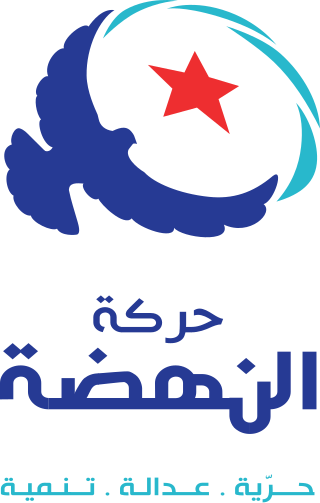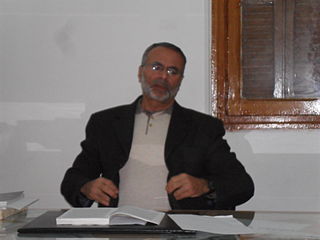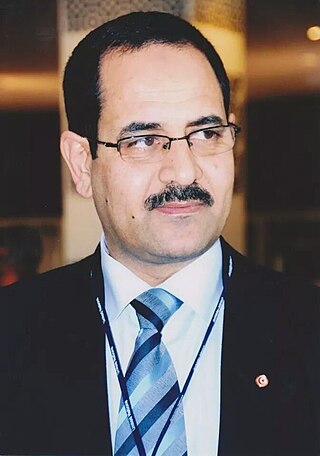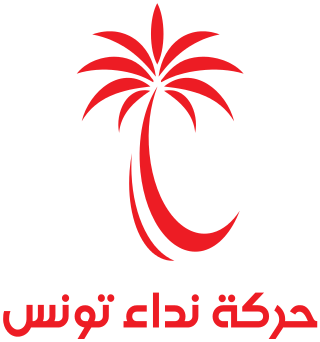
The Progressive Democratic Party, also referred to by its acronym PDP, was a secular liberal political party in Tunisia.

In its modern history, Tunisia is a sovereign republic, officially called the Republic of Tunisia. Tunisia has over ten million citizens, almost all of Arab-Berber descent. The Mediterranean Sea is to the north and east, Libya to the southeast, and Algeria to the west. Tunis is the capital and the largest city ; it is located near the ancient site of the city of Carthage.

Presidential elections were held in Tunisia on 23 November 2014, a month after parliamentary elections. They were the first free and fair presidential elections since the country gained independence in 1956, and the first direct presidential elections after the Tunisian Revolution of 2011 and the adoption of a new Constitution in January 2014.

The Democratic Forum for Labour and Liberties, also referred to as Ettakatol or by its French acronym FDTL, is a social democratic political party in Tunisia. It was founded on 9 April 1994 and officially recognized on 25 October 2002. Its founder and Secretary-General is the radiologist Mustapha Ben Jafar.

Mohamed Moncef Marzouki is a Tunisian politician who served as the fifth president of Tunisia from 2011 to 2014. Through his career he has been a human rights activist, physician and politician. On 12 December 2011, he was elected President of Tunisia by the Constituent Assembly.

The Ennahda Movement, also known as the Renaissance Party or simply known as Ennahda, is a self-defined Islamic democratic political party in Tunisia.

Beji Caid Essebsi served as the fifth president of Tunisia from 31 December 2014 until his death on 25 July 2019. Previously, he served as minister of foreign affairs from 1981 to 1986 and prime minister from February to December 2011.

An election for a constituent assembly in Tunisia was announced on 3 March 2011 and held on 23 October 2011, following the Tunisian revolution. The Assembly had 217 members. It was the first free election held in Tunisia since the country's independence in 1956, as well as the first election in the Arab world held after the start of the Arab Spring.

The Constituent Assembly of Tunisia, or National Constituent Assembly (NCA) was the body in charge of devising a new Tunisian constitution for the era after the fall of President Zine El Abidine Ben Ali and his Constitutional Democratic Rally (RCD)–regime. Convoked after the election on 23 October 2011, the convention consisted of 217 lawmakers representing Tunisians living both in the country and abroad. A plurality of members came from the moderate Islamist Ennahda Movement. The Assembly held its first meeting on 22 November 2011, and was dissolved and replaced by the Assembly of the Representatives of the People on 26 October 2014.

Abderraouf Ayadi is a Tunisian human rights activist, politician and lawyer.

Ridha Saidi is a Tunisian politician. He serves as the Minister of Economy under Prime Minister Hamadi Jebali.

Nidaa Tounes is a big tent secularist political party in Tunisia. After being founded in 2012, the party won a plurality of seats in the October 2014 parliamentary election. The party's founding leader Beji Caid Essebsi was elected President of Tunisia in the 2014 presidential election.

Mohamed Brahmi was a Tunisian politician. Brahmi was the founder and former leader of the People's Movement, which, under his leadership, won two seats in the constituent election in 2011.

The People's Movement or Echaab Movement is a political party in Tunisia. It is a secularist, social democratic, Nasserist and Arab nationalist party founded in April 2011. The composition of the party has changed several times as a result of mergers and splits. Between 2013 and 2014, the People's Movement was a member of the Popular Front coalition, one of the three main coalitions of political parties in Tunisia. The former leader and founder of the party, Mohamed Brahmi, was assassinated on 25 July 2013 by unknown killers.

The Wafa Movement, sometimes referred to as the Independent Democratic Congress, is a political party in Tunisia.

Parliamentary elections were held in Tunisia on 26 October 2014. Campaigning started on 4 October 2014. They were the first free regular legislative elections since independence in 1956, and the first elections held following the adoption of the new constitution in January 2014, which created a 217-seat Assembly of the Representatives of the People. According to preliminary results, Nidaa Tounes gained a plurality of votes, winning 85 seats in the 217-seat parliament, beating the Ennahda Movement and many smaller parties.

The Free Destourian Party, until August 2016 known as the Destourian Movement, is a Tunisian political party founded by former members of Tunisia's pre-revolution ruling party, the Constitutional Democratic Rally. In the 2014 presidential election, the Destourian Movement presented Abderrahim Zouari, Minister of Transport from 2004 to 2011, as candidate. The party is now led by the lawyer and MP Abir Moussi. Since early 2020, the party is leading in all opinion polls for the next Tunisian general elections, and its leader Abir Moussi is always second just after incumbent president Kais Saied. On 3 October 2023 the president of the PDL, Abir Moussi, was arrested in a series of political arrests and crackdown on the opposition launched by president Kais Saied.

Socialism in Tunisia or Tunisian socialism is a political philosophy that is shared by various political parties of the country. It has played a role in the country's history from the time of the Tunisian independence movement against France up through the Tunisian Revolution to the present day.

Nabil Karoui is a Tunisian politician and businessman. One of the key figures in the Tunisian media landscape, Karoui is CEO of Karoui & Karoui World and owner of the Tunisian television station Nessma. Karoui ran as a candidate in the 2019 Tunisian presidential election, finishing in second place.

Abir Moussi is a Tunisian lawyer and politician. She has been the president of the Free Destourian Party since 2016 and a member of Parliament since 2019. Abir Moussi is considered one of the most important and famous Tunisian politicians who defend the civil state and Bourguiba's approach. She is also known for her absolute rejection of political Islam movements and all forms of confusion between religion and politics. On October 3, 2023, Abir Moussi was arrested in front of the presidential palace of Carthage, in a series of political arrests and crackdown on the opposition launched by Tunisian president Kais Saied.


















